Ribble launches aero-enhanced Allroad range for roadies who keep riding when the tarmac stops
A trio of truly modern endurance bikes fulfils Ribble’s new 'Road+' ethos
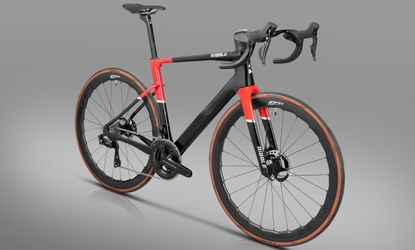

Ribble has launched three 'all-road' bikes under the collective 'exactly what it says on the tin' Allroad name. The new range falls under the direct-to-consumer brand’s new “Road+” ethos that marries road-focused performance with the capability to tackle light off-road segments.
Completing the range are the entry level Allroad SL - the model I've had the opportunity to ride ahead of the launch - the range topping Allroad SL R and the electric Allroad SL R e. All three boast comfort endurance geometry, but beyond that there are striking similarities as well as some significant differences, not least price.
Interestingly, Ribble has chosen to satisfy the growing all-road market by developing a collection of aero-inspired road bikes that can venture off road, rather than engineering a suite of gravel bikes with passable on-road performance. I think this is an entirely valid approach.
The state of tarmac - at least in the UK - means there's a demand from roadies wanting to switch up to a bike that’s rapid yet comfortable over long distances on poor road surfaces. A lightweight, sharp-handling bike that will tolerate the occasional gravel trail but won’t suffer blunted on-road performance due to a heavily built frame or 45mm tyres. They want an endurance bike reinvented for modern riding conditions.
“Money is tight for many of our customers, they want to get every pound of value they can out of a bike,” says Jamie Burrow, Head of Product, Ribble. “I believe the competitively priced, versatile Allroad range enables them to do just that. These are the road bikes that most cyclists will enjoy a better ride on than a dedicated race machine.”
Allroad SL R
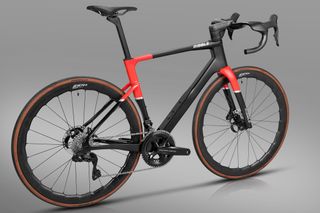
Top of the range is the Allroad SL R
In both appearance and build, the flagship Allroad SL R borrows heavily from the Ultra SL R, Ribble’s aero race bike. There’s a similar, deep, truncated headtube, which transitions organically into the slender top tube and uniquely profiled downtube. Ribble says the downtube shape makes the SL R faster with a bottle than without. Every part, from the wide forks to the slender aerodynamically profiled dropped seat stays has been developed to work as a system to cheat the wind.
For the first time, Ribble has used a blend of intermediate modulus Toray T1000 carbon fibre and high modulus M46 carbon fibre in the frame’s layup.
“This has allowed us to bring the weight down and, with the M46, stiffen it up in the key power transfer areas of the bike, says Burrow. “At the same time, the mix and layup keep it compliant enough in the areas that need to offer the level of comfort that’s important in an endurance bike.”
Ribble hasn’t provided a frame weight figure, but the total bike in top-level ‘Hero’ build, size Medium, weighs 7.5kg. Not the lightest in race bike circles, but impressive for an aero endurance bike.
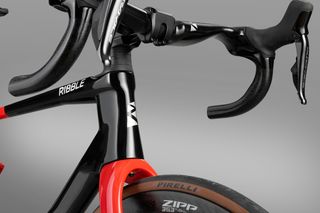
The Allroad SL R features Ribble's new aero-sculpted UB2 bars
Another first for the SL R, is the inclusion of new, eye-catching UB2 bars. “These work as a system with the forks and headtube to provide a fully aero optimised front end,” says Burrow, “that manages airflow around the rider.” The chunky, deep section bars provide a fully integrated, cable-free cockpit with direct mount levers.
Maximum tyre clearance for the SL R is just 38c, a clear statement of intent from Burrow and his team that this is a road bike and not a gravel bike. The geo tells a similar story.
Chainstay length is moderate at 415mm, as is the 985mm wheelbase for a size medium (equivalent 54). Stack is 568mm and reach is 376mm. These dimensions suggest the SL’s handling will be predictable yet agile – great fun to throw into a fast corner while bearing a smile, not a grimace.
Tyre choice will be critical. The sample bike that I’ve been shown was shod with fast 32c Pirelli P Zero Race TLR road tyres, but you can, of course, dial compliance and off-road potential up a notch by fitting wider, more gravel friendly rubber.
Allroad SL R e
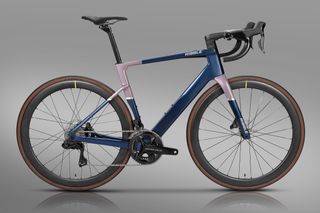
Ribble's Allroad SL R e features a Mahle X20 electric hub drive system
Essentially, the SL R e is an SL R fitted with an Mahle X20 electric hub drive system. While I have seen samples of the Allroad SL R and the SL, I haven’t seen or ridden the SL R e, so pre-launch details are a little scant.
Ribble says that the SL R e has a range of 140km, which can be increased to a massive 200km with an optional range extender. Let’s hope the bike is comfy! The SL R e weighs a very competitive 11.8kg in Hero build, size medium, so I suspect ride feel will remain natural.
Allroad SL
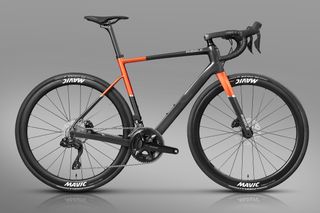
Entry into the range comes in the shape of the Allroad SL
Cheapest of the bunch, the Allroad SL - the model I've had the opportunity to log some miles on - starts at just £1,699 in base Sport guise. Like the SL R, it too features aero optimised tube profiles, but the bike shares more DNA in common with Ribble’s time-honoured R872, an endurance bike that won Cycling Weekly’s Editor’s Choice award in both 2018 and 2020.
The Allroad SL’s frame and fork are engineered from a blend of T700 and T800 carbon fibre – a step down from the SL R’s T1000/M46 build – nevertheless creating a bike that weighs in at a still respectable 8.8kg in range-topping Pro build, size medium. It shares some family resemblance with the SL R, the same characterful downtube profile and a fork with a wide, purposeful stance, but this is an altogether more conventional looking bike.
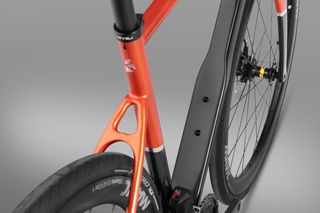
The Allroad SL's aero downtube profile is similar to the range-topping SL R but they are two very different bikes
“We worked really hard to deliver spec and price for the SL,” says Burrow. “In Pro build, which costs £2,999, you're getting a full carbon T700/T800 carbon mix frame, with Shimano 105 Di2 on Mavic carbon wheels shod with Pirelli branded tyres.”
Like the SL R, geometry is road endurance through and through. The 35c tyre clearance, which is surprisingly conservative for a modern Allroad bike, has enabled the same moderate chainstay length of 415mm, and a similar overall wheelbase of 986mm for a size medium (equivalent 54). Stack height, for the same frame size is 562.7mm, which is about 20mm less than a comparable Specialized Roubaix and, interestingly, about 6mm less than the SL R.
First ride
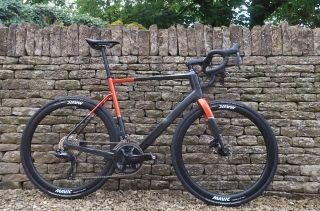
The Ribble Allroad SL was at home in the Cotswold hills, despite the poor road surfaces
Days before the launch, Ribble loaned me an Allroad SL in Pro spec, which comes fully loaded with a Shimano 105 Di2 groupset and Mavic Cosmic S 42 Carbon wheelset. My time with the bike was limited but I was able to squeeze in a decent couple of hours, riding my go-to, short but sweet circuit in the north Cotswolds.
While no-one would mistake the Cotswold hills for the Alps, or even the English Lake District, we do have some short but punchy ascents here – with percentages frequently reaching into the mid-teens. My 50km route sticks to the narrow rural lanes that trace a circuit to the east of Cheltenham, encompassing the pretty villages of Guiting Power, Notgrove, Turkdean, Hazleton, Compton Abdale and Withington.
Road surfaces vary enormously. There’s the beautifully surfaced Cat 3 climb out of Withington, which has featured in recent Tour of Britain stages, but this is an exception. Most of the roads are in an appalling state, littered with potholes, exposed gullies, broken surfaces and limestone gravel washed down from the local hills. It’s the perfect testbed for an all-road bike.
My first impressions confirm that the SL is very much a road bike. The relatively low stack height, perhaps emphasised by my own tall 190cm frame and no time for a proper bike fit, combined with the moderate chainstay stay length and wheelbase, provide a liveliness that’s often dulled in slacker gravel bikes.
The SL is light and agile enough to climb well. It’s plenty stiff enough too, I noticed very little flex in the bottom bracket area even when getting out of the saddle to put in some genuine efforts. Descending always remains fun. The aforementioned Withington Hill has a couple of tight switchbacks at its foot that can unsettle some bikes, which is always an unnerving experience. The SL was well-behaved throughout – it’s not the fastest of bikes I’ve ridden down that hill, but it remained both fluid and responsive.
The Mavic wheels, shod with 32mm Pirelli P Zero Road TLR tyres, weren’t troubled by the broken road surfaces or the patches of loose gravel I regularly encountered. I didn’t have time to take the SL further offroad but would consider swapping the tyres out for something more robust and better suited to looser surfaces if that were to become more of a focus.
The Allroad SL proved to be comfortable over 50km, but frankly that’s no distance for an endurance bike. I am looking forward to testing it on much longer rides over the coming weeks.
Specs
Since every Ribble bike is built to order, it’s possible for customers to customise their bike with different components at checkout on the brand’s website. Using Ribble’s web configurator, it’s even possible to specify a CustomColour livery.
Because of this, Ribble offers suggested builds rather than specific models with specs set in stone. These follow the convention: Sport, Enthusiast, Pro and Hero. Ribble is a direct-to-consumer brand, so specs are usually generous. For top-end bikes, such as the Allroad SL R, Sport level bikes are typically equipped with Shimano 105, Enthusiast with Shimano Ultegra and Hero with Shimano Dura-Ace.
The Allroad SL Sport starts at £1,699 up to the Pro at £2,999.
The Allroad SL R Sport begins at £2,999 through to the range-topping Hero spec at £8,299.
The Allroad SL R e Sport starts at £3,999, through to the Hero spec at £8,499.

Thank you for reading 20 articles this month* Join now for unlimited access
Enjoy your first month for just £1 / $1 / €1
*Read 5 free articles per month without a subscription

Join now for unlimited access
Try first month for just £1 / $1 / €1
Get The Leadout Newsletter
The latest race content, interviews, features, reviews and expert buying guides, direct to your inbox!
Cycling Weekly's Tech Editor Simon spent his childhood living just a stone’s throw from the foot of Box Hill, so it’s no surprise he acquired a passion for cycling from an early age. He’s still drawn to hilly places, having cycled, climbed or skied his way across the Alps, Pyrenees, Andes, Atlas Mountains and the Watkins range in the Arctic.
Simon has 35 years of experience within the journalism and publishing industries, during which time he’s written on topics ranging from fashion to music and of course, cycling.
Based in the Cotswold hills, Simon is regularly out cycling the local roads and trails, riding a range of bikes from his home-built De Rosa SK Pininfarina to a Specialized Turbo Creo SL EVO. He’s also an advanced (RYT 500) yoga teacher, which further fuels his fascination for the relationship between performance and recovery. He still believes he could have been a contender if only chocolate wasn’t so moreish.
-
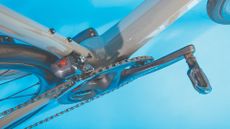 Everything you want to know about the Q Factor
Everything you want to know about the Q FactorWhat it is and why it matters; how to measure it; what the Q stands for, and more.
By Tyler Boucher Published
-
 My bike-mounted garage opener is a luxury gimmick – but it's worth every penny
My bike-mounted garage opener is a luxury gimmick – but it's worth every pennyIt's silly and extravagant, but also a huge convenience that I've come to appreciate in my daily cycling life
By Anne-Marije Rook Published